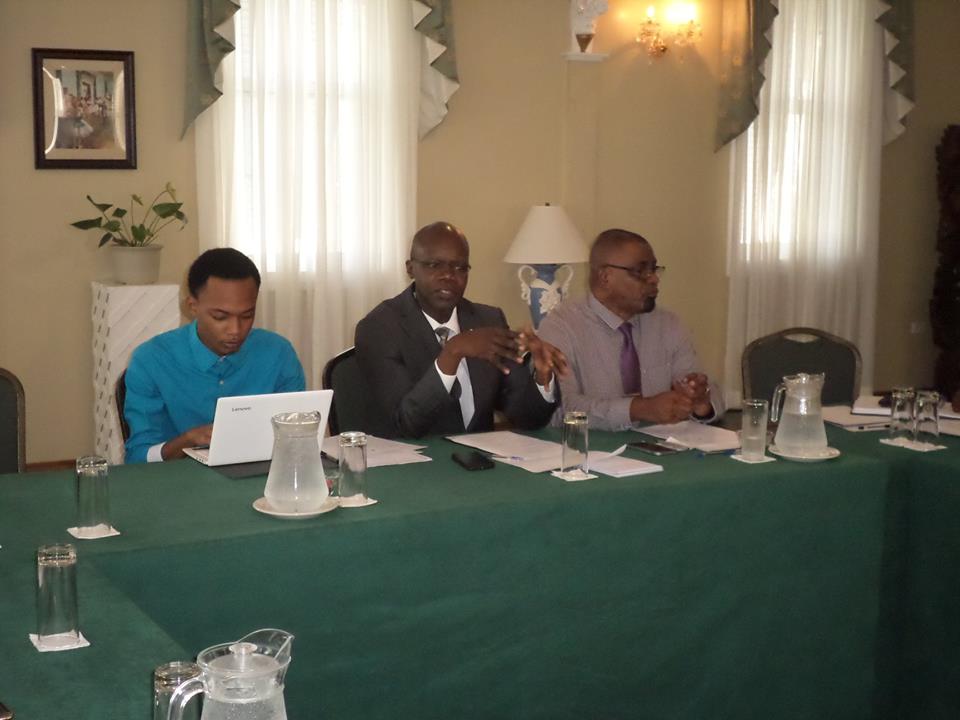
Workshop to develop strategy for domestic, innovative financing for HIV and Malaria in the Caribbean held in Georgetown, GuyanaPartnership of regional networks, government representatives, civil society leaders and advocates mobilize for increased domestic investment and increased resource allocation to HIV and AIDS budgets in the Caribbean
Image: (L-R) Dennis Glasgow, participant, Dr Martin Odiit, UNAIDS Country Director, Guyana and Suriname and Mr Dereck Springer, Director of PANCAP
Joint press statement:
- The Developing Country NGO Delegation to the Global Fund Board (DCNGO)
- Global Fund Advocates Network (GFAN)
- Caribbean Vulnerable Communities Coalition (CVC)
- Pan Caribbean Partnership against HIV and AIDS (PANCAP)
Tuesday, January 30 2018: The Developing Country NGO Delegation to the Global Fund Board (DCNGO), Global Fund Advocates Network (GFAN) and the Caribbean Vulnerable Communities Coalition (CVC), collaborated with the Pan Caribbean Partnership against HIV and AIDS (PANCAP), the mechanism that provides a structured and unified approach to the Caribbean’s response to the HIV epidemic to convene a joint meeting of advocates for domestic financing for HIV. The meeting is being held in Georgetown Guyana from January 29 to 31, 2018.
The purpose of the intervention is to create a strategic approach to raising awareness and advocacy for increasing domestic financing for HIV, AIDS and Malaria programmes through advocacy training and strategic planning.
At the core of the workshop is the development of a regional (Caribbean) strategy, which will be coordinated by a working group tasked with addressing key resource mobilization and domestic financing issues related to The Global Fund in Jamaica, St Lucia (OECS), Haiti, Belize, and Guyana.
In his opening remarks, Mr Jomain McKenzie, Communications Focal Point for the DCNGO emphasised that “any health burden is also a financial burden and where governments don’t always see the need, it is up to us to make the case for funding our health.” Mr McKenzie highlighted that civil society’s efforts in domestic financing send a signal to donors that we do play a role in the big picture of health funding – a role that goes beyond that of being beneficiaries.
In welcoming participants, Director of PANCAP, Mr Dereck Springer, underscored the importance of the involvement of civil society in advocating for increased financing by Governments for HIV. He emphasized that civil society has held the baton for HIV awareness from the inception and that their involvement is critical for the next phase of the Region’s response to the disease. The Director referred to the PANCAP Regional Advocacy Strategy as a model that can be strategically utilized for the intervention. He posited that the strategy propagates that civil society has the ability to mobilize unprecedented financial resources and enable communities to participate in designing health services that meet their needs.
Dr Martin Odiit, UNAIDS Country Director, Guyana and Suriname commended the organisers and participants of the intervention, stating his appreciated that the Caribbean is taking a positive step and being fully involved in the Global Fund replenishment as evidenced by the enthusiasm at the workshop. He also noted UNAIDS ongoing support to countries in developing HIV investment cases for sustainability.
The participants include representatives from Government, National AIDS Commission, advocates, and leaders of civil society organisations, namely the Caribbean Vulnerable Communities Coalition (CVC), Caribbean Forum for Liberation and Acceptance of Genders and Sexualities (CariFLAGS), Society Against Sexual Orientation Discrimination (SASOD) and the Caribbean Sex Work Coalition (CSWC).
The initiative is financially and technically supported by International Civil Society Support (ICSS) Global Fund Advocacy Network (GFAN) through the New Venture Fund of the Bill and Melinda Gates Foundation.
– ENDS –
What is PANCAP?
PANCAP is a Caribbean regional partnership of governments, regional civil society organisations, regional institutions and organisations, bilateral and multilateral agencies and contributing donor partners which was established on 14 February 2001. PANCAP provides a structured and unified approach to the Caribbean’s response to the HIV epidemic, coordinates the response through the Caribbean Regional Strategic Framework on HIV and AIDS to maximise efficient use of resources and increase impact, mobilises resources and build capacity of partners.
What is the DCNGO?
The Developing Country NGO Delegation is a voting constituency on the Global Fund Board and represents NGOs, from the Developing World, serving those affected by HIV/AIDS, TB, & Malaria. The Delegation seeks to influence decisions and policies to ensure strategic, continuous and appropriate responsiveness to the needs of those affected by the three diseases and the NGOs providing services to them.
Contact:
Timothy Austin
Communications Specialist
PANCAP Coordinating Unit
CARICOM Secretariat
Turkeyen, Greater Georgetown, Guyana
Email: taustin.consultant@caricom.org
Tel: (592) 222-0001-75, Ext. 3409 | Visit www.PANCAP.org
WHAT IS PANCAP?
PANCAP is a Caribbean regional partnership of governments, regional civil society organisations, regional institutions and organisations, bilateral and multilateral agencies and contributing donor partners established on 14 February 2001. PANCAP provides a structured and unified approach to the Caribbean’s response to the HIV epidemic, and coordinates the response through the Caribbean Regional Strategic Framework on HIV and AIDS to maximise efficient use of resources and increase impact, mobilise resources and build the capacity of partners.
What are the Global AIDS Strategy 2021–2026 targets and commitments?
If targets and commitments in the strategy are achieved:
- The number of people who newly acquire HIV will decrease from 1.7 million in 2019 to less than 370 000 by 2025
- The number of people dying from AIDS-related illnesses will decrease from 690 000 in 2019 to less than 250 000 in 2025.
- The goal of eliminating new HIV infections among children will see the number of new HIV infections drop from 150,000 in 2019 to less than 22,000 in 2025.
What are the 95-95-95 Targets for ending AIDS?
- 95% of People Living with HIV know their HIV status;
- 95% of people who know their status on treatment; and
- 95% of people on treatment with suppressed viral loads.
HELPFUL LINKS:
Global AIDS Strategy 2021–2026, End Inequalities, End AIDS
https://pancap.org/pancap-documents/global-aids-strategy-2021-2026-end-inequalities-end-aids/
Caribbean Regional Strategic Framework on HIV and AIDS (CRSF) 2019-2025
https://pancap.org/pancap-documents/caribbean-regional-strategic-framework-2019-2025/
